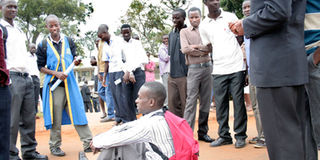Inside story: How things fell apart at Kyambogo University

Kyambogo students at a recent strike at the campus. The institution is still closed as Council forges ways of solving issues between lecturers and the Vice-Chancellor, Prof. Isaiah Omolo Ndiege. PHOTO BY ABUBAKER LUBOWA.
What you need to know:
What the university is facing is lack of financial discipline and poor administration.
KAMPALA
The confrontation that has left Kyambogo University closed, highlights the pinnacle of a rupture, forecast years ago, but nobody, not even Ministry of Education, the political steward” of the university, cared to make things right.
Kyambogo lecturers, who laid downed their tools two weeks ago, have since demanded the suspension of the Vice chancellor, Prof. Isaiah Omolo Ndiege, whom they faulted for “running down” the 10-year–old institution and undermining staff. However, Prof. Ndiege remains resolute and has damned the allegations as “diversionary” tactics fronted by “dishonest” staff.
An analysis by Sunday Monitor into the confusion that has paralysed the University and angered students as well as parents, attests to an established culture of maladministration and financial indiscipline created by former University administrators and disseminated by the current team.
Gross mismanagement
The Inspectorate of Government in 2009 found that top University managers were involved in gross mismanagement of its finances and other resources. Although Prof Lutalo Bosa, the then VC, and other top managers were later forced to retire in public interest, other much-needed reforms at the University have never been implemented to avert the possibility of a deadlock.
The IGG had asked the Ministry of Education to keep a close eye on the university and to avert the possibility of mismanaged and ensure that the institution becomes a federal University with constituent colleges with emphasis on promotion of Science and Technology takes shape.
Under the proposal as contained in the Education white paper report, 1992, each constituent college would be headed by a principal, in accordance with the provisions of Section 29 of the Universities and Tertiary Institutions Act 2001, with an overall Vice Chancellor.
Nearly 20 years later, a senior official in the Ministry of Education told Sunday Monitor in the week that the “viability” of this plan was still being discussed.
“The thinking was that the merger of the former Uganda Polytechnic Kyambogo (UPK), the Institute of Teacher Education, Kyambogo (ITEK), and the Uganda National Institute of Special Education (UNISE) would effectively work,” a source said. “The clashes between the VC and the academic staff are a result of the delayed process.”
Those on the fence say the roadblock to moving from institutional paralysis to profound systemic renewal at Kyambogo University is the missing collective leadership capacity to draw together all key stakeholders and involve them in a process that begins with “uncovering common intention” and ends with “creation of profound innovation” needed to fix systems.
The latest Auditor General’s report also offers a pick into the row at Kyambogo University. The Auditor General highlights the fight between the University Secretary and the Vice Chancellor in managing the financial affairs of the University.
Review process
A review of the payment processing system revealed that payments approved by the University Secretary (Accounting Officer) are subjected to further review and approval by the Vice Chancellor which results into a conflict in roles between the two offices in relation to the boundaries of responsibility and the extent to which the VC can fulfill his responsibility for the financial affairs of the University.
The University wants to petition the Attorney General for legal clarification. In March last year, the procurement watchdog, PPDA, carried out a forensic audit into irregularities in the procurement process at Kyambogo University after it was reported that millions had gone missing through unclear circumstances. This was in additional to Auditor General’s annual reports issued in 2009/10 and 2010/2011 financial years.
“This implies that management does not take the matters seriously,” Mr John Muwanga said.
The University has also failed to pay more than Shs3.8b in workers contributions to the National Social Security Fund. When this matter leaked to the staff last year, they accused Prof Ndiege and his team of misusing their retirement benefits.
In all the previous reports, the auditors have been unequivocal in highlighting the extent of the financial impropriety at Kyambogo University. But even as lawmakers ask Prof Ndiege to step aside, Lwemiyaga MP Theodore Ssekikubo and other members blame Parliament for doing little to avert the crisis at Kyambogo. Kyambogo University’s teething troubles are well documented in AG and PAC reports, but Parliament has not found time to debate these reports.




